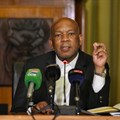In his 2024 State of the Nation Address (Sona), President Ramaphosa assured South Africa that the cessation of loadshedding was imminent. Yet, less than a day later, the nation was thrust into darkness as load shedding Stage 6 was enforced due to the failure of two power generating units.

Dominique dHotman, head of Ooba Solar
The timing’s irony did not escape Dominique dHotman, the head of Ooba Solar. “The President outlined several government actions aimed at terminating load shedding in his Address. However, the severe blackouts experienced over the weekend clearly indicate that we are far from achieving any tangible and lasting solutions.”
To provide homeowners and businesses with a clearer picture of South Africa’s actual progress in combating loadshedding, dHotman scrutinises the most significant pledges made by President Ramaphosa during SONA, juxtaposed with the current energy landscape.
Eskom reforms
In his speech, the President referenced the implementation in 2023 of a major debt relief package that would “enable Eskom to make investments in maintenance and transmission infrastructure and ensure its sustainability going forward”.
He indicated that this bailout would give Eskom the funds necessary to upgrade its infrastructure and look for alternative avenues of electricity generation to make the current energy system more competitive and reliable.
“When reading the fine print of that R254bn bailout from Treasury, however, one finds that Eskom is prohibited from making any capital expenditure outside of essential maintenance on current equipment and power stations,” comments dHotman.
“However, given that Eskom is prohibited from taking on any further debt, it is unclear where the State Owned Enterprise will get the funds necessary to upgrade transmission infrastructure or to invest in additional generation capacity.”
Private investment on the grid
President Ramaphosa referenced that his government has “implemented sweeping regulatory reforms to enable private investment in electricity generation, with more than 120 new private energy projects now in development”.
It’s true that regulatory changes have created a liberated electricity market that has allowed private players to come to the fore, with energy traders stepping up to buy and sell privately generated power which has expanded supply.
The majority of big corporates are stepping away from fossil fuels and embracing renewable energy sources, with many setting the goal of becoming carbon neutral in the next few decades
“Necom has been set up to coordinate this integrated action plan and while there has been progress, efforts to increase capacity will remain fragmented without improved communication and integration with the private sector. Many companies and residential homes still feel like it’s up to them to find alternative power solutions, as evidenced by the massive uptake of solar panels in residential homes over the last three years.”
Renewable energy investment
On the topic of solar, the speech touched on the connection of “more than 2,500MW of solar and wind power to the grid,” and plans to build more than 14,000km of new transmission lines to accommodate renewable energy over the coming years.
For context, the CEO of Adenco reported that South Africa has built a yearly average of 400km of new grid over the past decade. Achieving the President’s 14,000km target in the next ten years would require a 3.5x increase in build performance.
“Unfortunately, these transmission expansion plans are currently financially bottlenecked by the terms of Eskom’s bailout package and also physically constrained by the lack of skills available in the country to put this into action,” says dHotman.
Government has secured private funding from European leaders to assist with expansion once these issues are resolved with the help of the newly formed National Transmission Company
In the residential property context, the uptake of renewable energy through solar panel installation seems much more promising. The Ppesident referred to the doubling of rooftop solar capacity installations across the country in just the past year, and dHotman agrees that this aligns to the demand levels that Ooba Solar has seen.
“We have several reputable and vetted suppliers on our platform and have seen a rise in demand for solar installations, aligning to the increased ease of accessing financing, including as an add-on to a new or existing home loan.”
“This is a savvy move from homeowners who want to move away from reliance on the grid.” He adds that solar panel tax incentives have contributed to the customer value proposition but have not proven to be a big driver of change in customer demand.
End of loadshedding in sight
While dHotman remains ever the optimist, he shares that analysis of the recently released Integrated Resource Plan (IRP) reveals that the government’s strategy leaves a lot to be desired.
“Load shedding cannot be eliminated without a concerted effort to stem the electricity supply deficit and Eskom’s electricity availability factor (EAF) continues to decline year-on-year, currently at 54.7%”.
“For loadshedding to be eradicated by 2027 – the date some government representatives have shared – our EAF will need to be at a minimum of 66%, but if the current trend continues, an EAF of 49% by 2027 seems more likely.”
“Thus, both households and businesses are left with no choice but to invest in alternative power sources using their own capital if they’d like to see an end to loadshedding before the decade is up,” he concludes.











